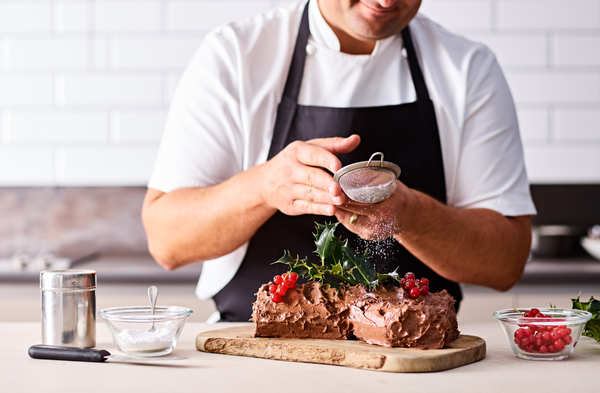Recipes
Get in touch
- hello@thewoodspeen.com
- 01635 265 070
-
The Woodspeen Restaurant & Cookery School
Lambourn Road, Woodspeen, Newbury, RG20 8BN
Sign up to our newsletter
Keep up to date with our latest news, events and recipes with our monthly newsletter.
The Woodspeen is owned by The Woodspeen Restaurant Limited, a company registered in England and Wales under company number 08524322 and with our registered office at TVP2, 300 Thames Valley Park Drive, Reading, Berkshire, RG6 1PT.
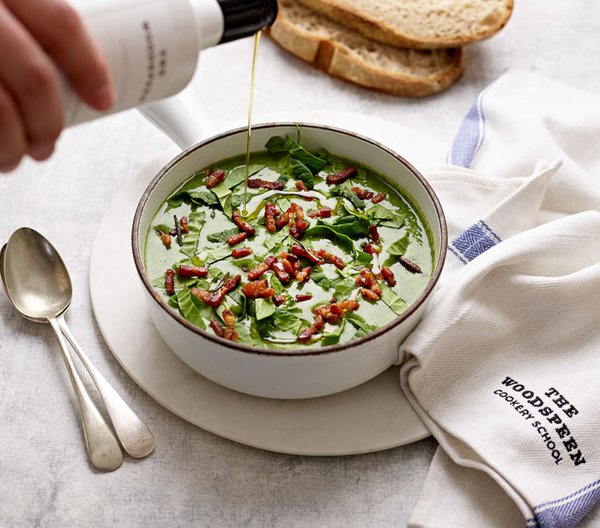
Wild garlic soup, bacon and olive oil
INGREDIENTS
100g butter
1 large onion – peeled and thinly sliced
2 large potato – peeled and thinly sliced
750ml water
400g wild garlic
200g spinach
Salt and pepper
Olive oil and chopped garlic leaf, bacon lardons to serve (optional)
METHOD
Wild garlic is a pleasant way of adding garlic into a soup without it being too strong and overpowering. Wild garlic as the name suggests grows in the wild and is plentiful in local woodland from March to June*. At its best and most flavorsome when bright green before the flowers open.
*(If you’re unsure what you are picking take someone who knows)
1. Place a pan on the stove and turn on to a medium heat and add the butter.
2. Once the butter has melted add the onion to the pan and cook the onion gently, ensuring there is no colour.
3. When the onion has started to soften add the sliced potato and cook for a further 10 minutes again allowing no colour.
4. When the potato is soft and cooked add the water and bring to the boil for 5 minutes. Add the wild garlic and boil for a further 5 minutes.
5. Place into a blender and add the spinach, this is best done in two batches. Blend for 1 minute until smooth. Pour into a container and lightly season with salt and pepper to taste.
6. If serving immediately reheat gently on the hob, pour into serving bowls and drizzle some olive oil and chopped garlic leaf and cooked bacon lardons over the top, if preferred
Chef’s tip
If preparing in advance, add some ice cubes when seasoning in step 5 to chill quickly and to keep the freshness and colour of the soup, then place into the fridge. Can be stored for up to 3 days in the fridge.
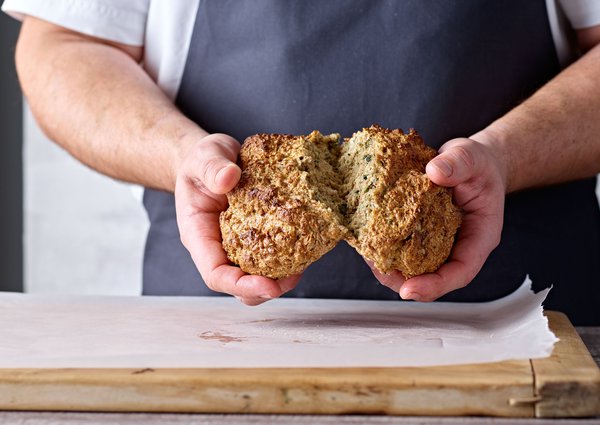
Winter Pumpkin soup, spiced lentil cake and soda bread
INGREDIENTS
For the soup:
500g pumpkin – peeled, seeded and diced in to 1 inch cubes
1 large shallot – peeled and sliced
200g unsalted butter – diced
5g table salt
10g parmesan – grated
600ml chicken or vegetable stock
Crème fraiche – to serve
.
For the soda bread
250g bread flour
5g salt
7g bicarbonate of soda
50g sunflower seeds
55g feta cheese – cut into cubes
250ml buttermilk
5g fresh mint – chopped
.
For the spiced lentils
100g cooked puy lentils
50g red onion finely chopped
60ml soy sauce
60ml balsamic vinegar
40ml tomato sauce (ketchup)
20ml sweet chilli sauce
15g chopped pickled ginger
Pinch ground cumin
.
For the cake
340g spiced lentils (the above recipe makes this)
100g diced onion
160g flat mushrooms diced small
2g coriander seeds (about 15 seeds)
350g pumpkin seeds
20g sesame seeds
40g pine nuts
30g chopped tarragon
80g panko breadcrumbs
METHOD
We love the smooth velvety texture of this soup, and for an everyday recipe the soup alone is delicious. However, if serving for an occasion making the soda bread and spiced lentil cake too is well worth the effort.
For the soup:
1. Over a medium heat in a large heavy bottomed pan soften the shallot and the diced pumpkin with the butter
2. Once softened add the salt and stock, bring to a simmer
3. Place a lid on the pan and gently simmer for 10 to 15 minutes or until the pumpkin is cooked through
4. Remove from the heat and allow to cool slightly
5. Add the grated parmesan and mix well
6. Blend the soup until smooth in a liquidiser
7. Check for seasoning and add a little more salt if you like
8. If serving alone, serve with crème fraiche and a twist of black pepper (or omit the crème fraiche if serving with spiced lentil cake)
Try roasting your pumpkin seeds, they make a great crunchy addition to soups, salads, casseroles and curries. Alternatively put them raw on your bird table.
For the soda bread:
1. Place the flour, salt and bicarbonate of soda into the bowl and rub together
2. Add the seeds and cheese and stir in, then add the buttermilk and mint and fold together gently until all the dry flour is incorporated
3. Once it is all together, take out of the bowl and roll it around in some flour to make it easier to handle
4. Place on to a grease proof tray and put 2 cuts on top 2cm deep to make a cross and place into the oven as soon as it is finished – (this will not require any proving)
Bake at 240℃ for about 17 minutes
For the spiced lentils:
1. Cook the onions without colour and when translucent add the cumin and cook out for 5 minutes without burning
2. Add the soy sauce and balsamic and reduce by half
3. Remove from the heat and stir in the cooked lentils and the rest of the ingredients, check the seasoning and allow to cool
For the cakes:
1. Roast the nuts and seeds in oil until golden brown
2. Add the onion and mushrooms and cook for 5 minutes
3. Add the spice lentil mix, panko breadcrumbs and tarragon, mix well
4. Season and allow to rest for 1 hr to allow the panko breadcrumbs to take on the flavour and tighten the mix
5. When ready give a good mix again and then weigh into 50g balls and shape
6. Coat with a little flour, egg and breadcrumbs and then store until required
To finish the cakes for the soup, either deep fry on 180 for 3 minutes until golden or pan fry until golden on both side in a little oil on a moderate heat and place in the oven for 2 minutes at 180℃ to ensure the core temperature is hot.
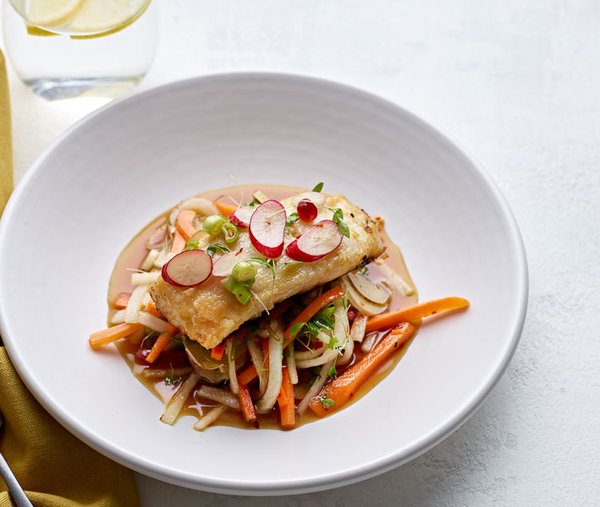
Miso cod, raw vegetable salad
INGREDIENTS
For the cod:
10ml sake
30ml mirin
45g white miso paste
15g sugar
4 x 230g cod fillet, scaled and pin boned
.
For the salad:
½ cucumber
2 carrots – peeled
4 spring onions
4 garden radishes
1 clove of garlic – thinly sliced
3 tbsp soy sauce
1 red chilli – de seeded
25g pickled sushi ginger – finely chopped
15ml sushi ginger liquid (this will be found in the packet of pickled sushi ginger)
5g coriander – chopped
METHOD
This dish is light and simple but full of flavour and has a distinct taste of salty sweet notes from the marinade. The raw vegetables bring a great texture and freshness to the dish
Note: the fish for this recipe should be prepared 2 or 3 days prior to cooking the dish.
Serves 4
Equipment: 2 x glass or plastic bowls, chopping board, knife and small sauce pan
1. Bring the sake and the mirin to a boil in a medium saucepan over high heat. Boil for 10 seconds to evaporate the alcohol.
2. Turn the heat down to low and add the miso paste, mixing with a wooden spoon. When the miso has dissolved completely, turn the heat up to high again and add the sugar, stirring constantly with the wooden spoon to ensure that the bottom of the pan doesn’t burn. Remove from the heat once the sugar is fully dissolved. Cool to room temperature.
3. Pat the cod fillets dry with paper towel. Cover the fish all over with the miso mix and place in glass or plastic bowl and cover tightly with cling film. Leave to sit in the refrigerator for 2 to 3 days.
4. Preheat an oven at 180°C. Lightly wipe off any excess miso left on the cod but don’t rinse it off. Place the fish on a tray with greaseproof on, cook until the surface of the fish turns brown. This will take about 20 – 30 mins.
5. Slice the carrot, spring onions and radish as thin as possible, cut the cucumber in half and scrap out the seeds, slice the cucumber into thin slices they should look like ½ moons.
6. Place the cut vegetables into a bowl and mix in the soy sauce and sushi ginger juice.
7. Sprinkle with sliced red chilli (if you want it to be more spicy leave in the seeds), sushi ginger and garlic.
8. Mix well and leave for 5 minutes to marinade and start to take on the flavour.
9. Serve by placing in the vegetable mix in 4 serving bowls, place the fish on top and sprinkle with chopped coriander.
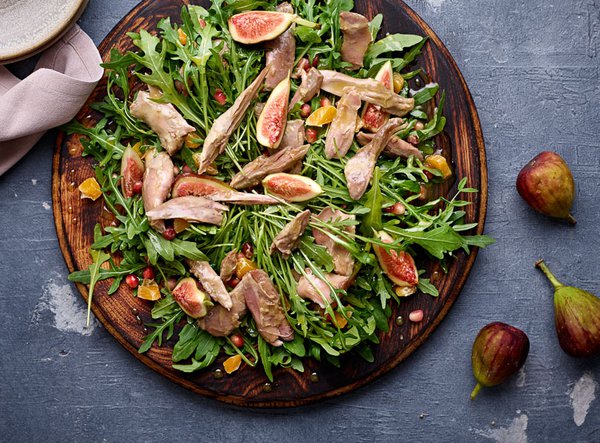
Spiced duck leg salad, orange and pomegranatead
INGREDIENTS
For the duck marinade:
6 duck legs
100g sugar
100g sea salt
6g Chinese 5 – spice powder
½ thinly sliced orange
.
To cook the duck legs:
6 cured duck legs, washed for 10 minutes
500g duck fat, or oil – enough to totally submerge the duck legs
2 bay leaves
1 tsp black peppercorns
Parsley to finish
.
For the orange dressing:
250g fresh orange juice
5 orange zests
15g caster sugar
50ml white wine vinegar
200ml vegetable or sunflower oil
50ml fresh orange juice to let down if needed
.
To finish:
Salad leaves – your choice, we used rocket
4 figs – quartered
1 orange
1 pomegranate
METHOD
Serves 6:
For the duck marinade:
1. Mix all together except the duck legs.
2. Rub mix all over the duck legs and place into a tray, cover with cling film and keep in the fridge for 8 hours covered.
To cook the duck legs:
1. Heat oven to 150°C.
2. Wipe the duck with kitchen paper and pat dry.
3. Put the duck in a 15cm pan and cover with the oil or duck fat. Add the bay leaves and peppercorns and place in the oven and cook for about 4 hours with the pan lid on.
4. You are looking for the meat to be falling away from the bone if gently pressed with a spoon.
5. Take out the oil, place on plate and cover with cling film, allow to chill for 30 minutes.
6. Remove the cling film from the plate and gently pull the thigh bone out, now shred the meat making sure to remove the skin, put onto a plate into the fridge to cool down and firm up. Meanwhile make the orange dressing (see chef’s tip).
For the orange dressing:
Chef’s tip: This dressing needs to be made enough in advance that it has time to cool before serving and can be made up to 2 weeks in advance and stored in the fridge.
1. Gently simmer 250g of orange juice, zest and sugar to reduce to approximately 100ml.
2. Slowly add the white wine vinegar and oil to the reduced orange juice mix whilst blending with a hand blender until it emulsifies and becomes thicker
3. If it has become too thick you can add what you need of the additional 50ml of orange juice to loosen the consistency.
To finish:
1. Place the duck in a pan on a medium heat with some of the dressing and warm. Dress the salad leaves (reserve a little to dress the figs) and place on a board, place the cooked duck meat around, finish with the figs dressed in the dressing, scatter with the chopped orange and pomegranate seeds. Season to taste.
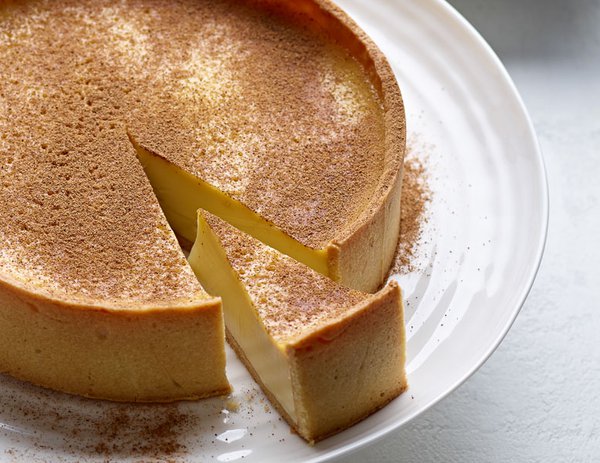
Custard Tart
INGREDIENTS
Custard mix:
750ml whipping cream
1 vanilla pod
320g egg yolk
1 egg
100g sugar
–
Sweet pastry:
250g icing sugar
250g butter at room temperature
2 eggs at room temperature
600g plain flour
1 egg yolk (for egg wash)
METHOD
Another all time favourite from our restaurant menu, perhaps it brings back fond childhood memories or perhaps just the smooth creamy texture is enough to leave you wanting more!
Custard Mix:
1. Put the cream into a pan, scrape in the vanilla seeds and pop the pod in too for added flavour.
2. Start to bring the cream to the boil, whilst heating up whisk the egg, egg yolks and sugar until the consistency of the mix is light and fluffy and can hold a ribbon shape when the mix is drizzled from the whisk.
3. When the cream reaches the boil, pour the cream over the egg mixture, whisking while doing so, (so as not to scramble the mix).
4. Pass the mixture through a sieve into a jug, leave to cool slightly, covered with cling film to stop a skin developing.
Sweet Pastry:
1. Beat the sugar and butter together until light and fluffy in a mixing machine and using a paddle attachment (this will take about 10 minutes).
2. Add the eggs one at a time whilst continuing to mix, only adding another egg when the first is fully incorporated.
3. Finally add the flour, when the mixture comes together as a dough stop mixing so as not to overwork the mixture.
4. Wrap the pastry in cling film and leave to rest in the fridge for 20 minutes minimum, but can be left overnight if you wish to make the night before.
5. Roll it out on a floured surface and line your desired tart case.
6. Blind bake the pastry at 170°C for 15 minutes or until lightly golden in colour and when cooked give it a quick egg wash using just the yolk.
7. Leave the base empty and return it to the oven at 100°C, pour the filling into the case whilst in the oven and cook until the mixture wobbles very slightly in the centre of the tart. Depending on the depth of your mould it could take anything up to 1hr 15 minutes.
8. Turn the oven off and leave the oven door slightly open to allow the tart to cool for 30 minutes before removing and leaving to cool further.
To serve:
Serve cold with good quality ice cream or sorbet. We love to serve with rhubarb ice cream or sorbet, as it creates a classic combination but your family favourite may be even better!
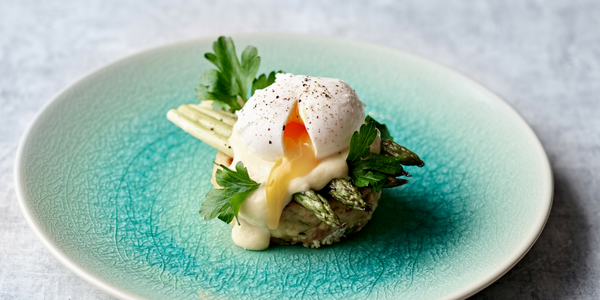
Bubble and squeak, asparagus and poached egg
INGREDIENTS
For the Bubble and squeak:
200g plain cooked potato
½ shallot – chopped
5g parsley – chopped
80g cooked bacon lardons
30g butter
80g blanched chopped cabbage
Salt and pepper to taste
To coat:
Plain flour – approximately 100g
2 or 3 Eggs – whisked
Panko breadcrumbs – approximately 100g
.
For the Asparagus:
2 bunches of asparagus – depending on bunch sizes
10g Salt
500ml water
.
For the poached eggs:
6 fresh free range eggs
600ml water
200ml white wine vinegar
Pinch of salt
METHOD
Brunch, lunch or supper, you can decide! We like to add a nice dollop of béarnaise sauce too.
Serves 6:
Equipment 15cm deep pan, slotted spoon, bowl and ice, cutters, chopping board, timer
For the Bubble and squeak:
1. Peel and chop the potatoes and cook in salted boiling water, bring to a boil and then turn down to a simmer and cook for 15 minutes
2. Once the potato is cooked pass into a colander and allow to dry out for 5 minutes in the colander over a bowl
3. While the potato is drying place the butter into a frying pan turn onto a medium heat and add the bacon lardons.
4. When the lardons start to go golden add the sliced shallot and cook for 2 minutes continuing to stir so no more colour is added but the shallots start to soften
5. Once the mix is done, place into a bowl and then put aside ready to add the mash
6. Mash the potato with a masher or ricer and then place into the bowl with the onions and bacon
7. Add the rest of the ingredients, lightly mix and form in to round shapes
8. Coat with flour, then egg and finally panko breadcrumbs – neaten up into a round flat shape like a fish cake
9.Now they are ready to pan or deep fry on 180c for 4 to 5 minutes depending on size to just colour and warm the mix through.
For the asparagus:
1. Place the water and salt into a pan and bring to the boil
2. While you are waiting for the water to the boil, peel the asparagus
3. When the water is boiling place the asparagus into the pan and cook for 2 minutes and serve. (Test the asparagus are ready by pinching the tip to ensure it is soft or putting a knife in the root, it should go in easily)
For the poached eggs:
1. Bring all the ingredients except the eggs to a boil in a deep small pan
2. Once boiling put a timer on for 2 minutes 30 seconds and have a bowl of ice water ready (if using)
3. Now crack the eggs gently one by one into the pan and when the last one goes in, start the timer
4. The water will stop boiling due to adding the cold eggs, when it comes back to the boil turn it to a steady simmer otherwise the eggs will break up and the pan will boil over
5. When the timer goes off, remove from heat and get the eggs out, drain on kitchen paper and serve.
Alternatively, you can place in the bowl of ice water, then remove them and store them on a cloth on a tray for up to a day in the fridge. To reheat, add to a pan of boiling water for 1 minute.
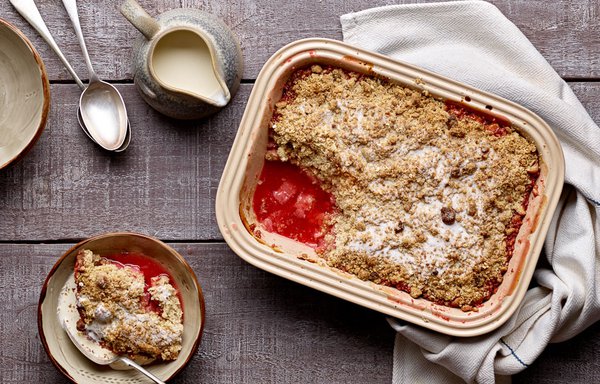
Rhubarb Crumble
INGREDIENTS
For the rhubarb crumble
1,200g rhubarb
160g grenadine
120g sugar
.
For the topping
200g flour
150g butter
200g oats
264g demerara sugar
8g baking powder
10g salt
110g macadamia nuts (toasted and roughly chopped)
160g desiccated coconut
60g ground almonds
METHOD
Rhubarb is in season from April and on into much of the summer. If you are lucky enough to grow some in your garden, do remember stalks should be pulled rather than cut to prevent rotting of the remaining stump.
This crumble is obviously great served with custard but perhaps in the summer some pouring cream or caramel ice cream could be a nice alternative.
Serves 12:
Slice the rhubarb into 2cm thick pieces and place into the bottom of the pie dish, sprinkle over the sugar and grenadine and mix with a spoon
For the topping in a separate bowl rub the flour and butter together with your fingertips until it looks like a crumb mix
Now mix in the rest of the ingredients and place on top of the rhubarb mix
Place in a pre-heated oven at 170 degree C/gas mark 3 and cook for 40 minutes, until the crumble is golden brown.
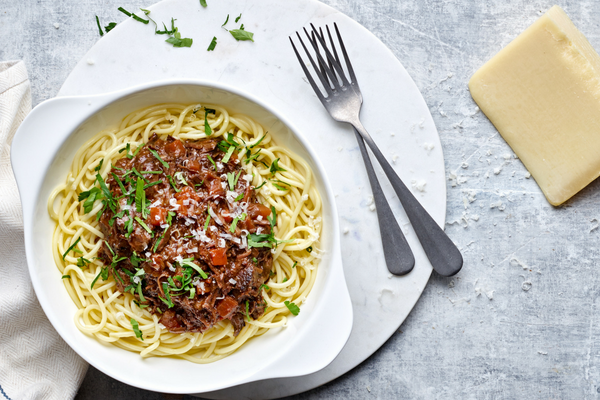
Beef Cheek Bolognaise
INGREDIENTS
1ltr chicken stock or equivalent cube/powder
50g gravy granules
3 tomatoes cut into 4 wedges
50ml white wine vinegar
250ml red wine
2 sprigs of rosemary
1 bulb garlic – sliced in half
75g tomato ketchup
8 drops Worcestershire sauce
1kg ox cheeks – cut into small pieces
300g onions – roughly chopped
350g button mushrooms – each one cut into ½
10g flat parsley
200g carrots – peeled and diced
METHOD
This recipe takes 8 hours to cook, but don’t let this or the beef cheeks put you off. Beef cheeks (ox cheeks as you will find them in good butchers and supermarkets) are a great tasty alternative to mince and relatively in expensive for the quality of the dish. Cooking them slowly produces the soft and tender meat, that is full of flavor.
1. Place a pan onto the stove and heat some oil until hot.
2. Add the ox cheeks and begin to colour on each side until brown,this will take around 5 minutes.
3. Once coloured, add the chopped onions, diced carrot and mushrooms and colour them for 5 minutes more.
4. Now add the chopped tomatoes and vinegar and scrap the bottom of the pan to remove any cooking sediment, this is all flavour so good to clear the base of the pan, add the red wine and bring to the boil for 1 minute.
5. Place the rosemary, garlic and chicken stock into the pan, turn up the heat and bring to the boil, once boiling mix in the gravy granules, tomato sauce and Worcestershire sauce. Mix well and place in an oven at 90°c and cook for 8 hours with a lid on the pan or casserole dish.
6. Once cooked breakdown the meat by pushing on it with a fork and mix together. Add some chopped parsley, and serve over spaghetti, with a sprinkling of Parmesan if you wish. This can also be served at a later time, chill down before adding the parsley, and store covered in the fridge for up to 4 days, to reheat simply place on a low heat and add the parsley just before serving.
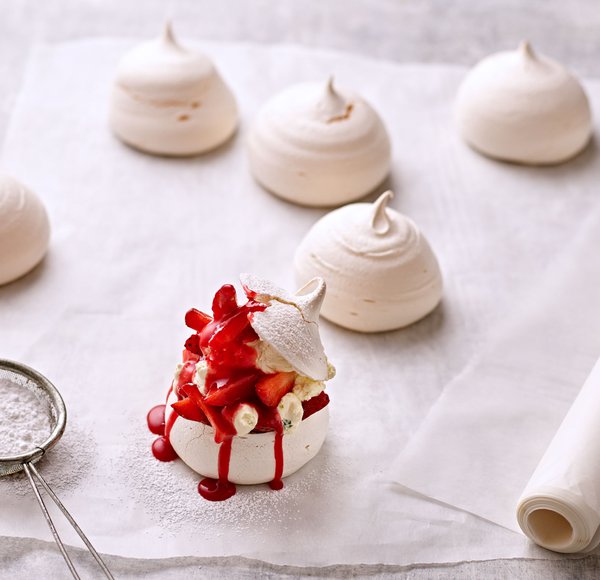
Strawberry Pavlova
INGREDIENTS
For the pavlova:
120g egg white
240g caster sugar
5g corn flour
10ml white wine vinegar
.
For the lime cream:
600ml cream
60g icing sugar
Zest of 2 limes
Juice of 1 lime
6 leaves mint chopped
.
For the macerated strawberries:
500g strawberries
2 lime zest and juice
70g sugar
METHOD
Serves 12 – Individual nests
Equipment bowl, whisk, piping bags, baking tray, electric mixer
For the pavlova:
1. In an electric mixer whisk the egg whites to a medium peak, sprinkle in one third of the sugar and continue whisking for another 2 minutes.
2. Add another third of the sugar and whisk for another 2 minutes, finally add the remaining sugar and give a final 2 minutes whisking.
3. Add the corn flour and white wine vinegar and whisk to incorporate.
4. Put the mix into a piping bag, and put some grease proof paper on to baking trays, draw a 10cm circle 12 times. Pipe the mix into the circles starting from the middle of each circle, make sure the bag is touching the paper allowing it to spread out to the edge of the circle and then lift up to a point.
5. Bake at 140°C for 20 minutes then leave to cool in the oven for a further 45 minutes with the oven off to dry the mixture, best to leave overnight.
For the lime cream:
1. Place all the ingredients into a bowl and whisk until a soft peak is formed.
2. It wants to just hold in the whisk and if it drops into the mix and holds a peak is good to put into piping bag.
For the macerated strawberries:
1. Cut the tops off the strawberries, then cut in half and place into a bowl.
2. Zest the lime and then squeeze the juice onto the strawberries.
3. Sprinkle over the sugar and mix well. Allow to sit for 1 hour.
To serve:
Remove the top of each meringue and fill with the lime cream and then the macerated strawberries and juice. Put the top back on and dust with icing sugar
Pimm′s
INGREDIENTS
8 strawberries
2 oranges
A bunch of mint leaves – use what you wish
Cucumber slices – we use about a quarter of a cucumber
Ice cubes
200ml of Pimm`s No.1
320ml of lemonade
METHOD
The quintessential British summer drink, not just for Wimbledon fortnight!
1. Cut strawberries, cucumber and orange
2. In a jug add ice, Pimm’s No.1, all the fruit and top up with lemonade
3. Stir and serve

Mandarin Mojito
INGREDIENTS
1 mandarin (half to be crushed and half for the garnish)
2 sugar cubes
8 mint leaves plus a little bunch for the garnish
45ml of white rum
15ml of mandarin liquor
Half a lime – juiced
Crushed ice
50/60ml of soda water
METHOD
A twist on the classic Mojito. Possibly perfect on most days, but particularly perfect, on a gorgeous sunny day!
1. Cut half of the mandarin in small wedges and crush it with sugar and mint
2. Add rum, mandarin liquor and lime juice
3. Add crushed ice
4. Top up with soda water
5. Stir it and garnish with two slices of mandarin, a bunch of mint and straws
Tip: Don’t muddle the mint too much or it will become bitter.
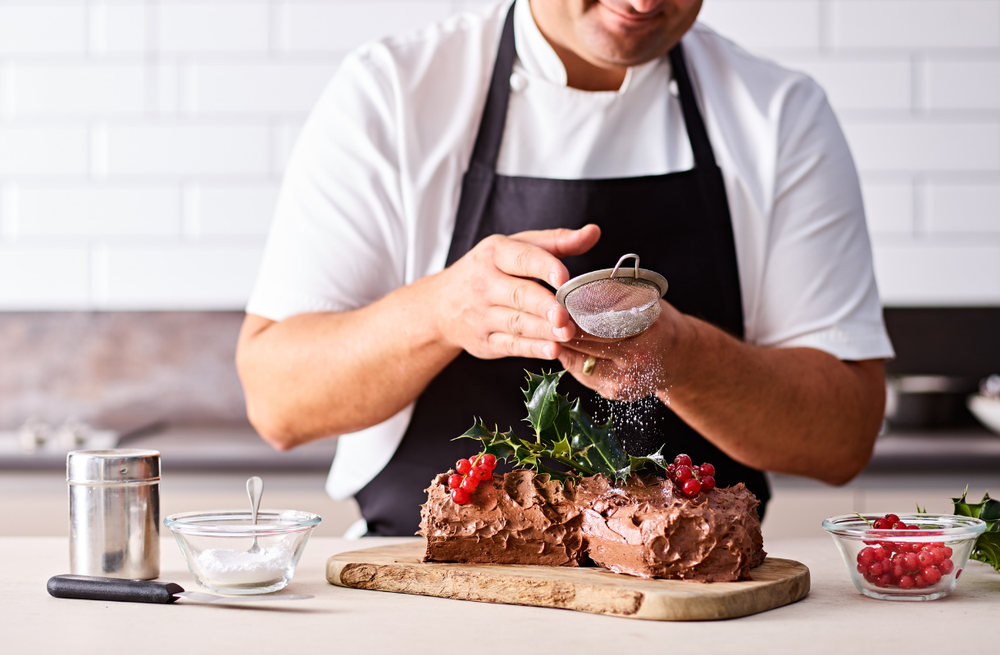
Yule log
INGREDIENTS
Ingredients for the buttercream:
250g of soft butter
350g icing sugar (put through a sieve to remove any lumps)
25g cocoa powder
50ml cream
.
Ingredients for the sponge:
5 eggs
150g caster sugar
100g plain flour
20g cocoa powder
40g melted butter
METHOD
For the buttercream:
1. Place the softened butter, sieved icing sugar and cocoa powder into the mixing bowl and slowly mix in the mixer using the paddle attachment on a low speed
2. When all of the icing sugar has gone into the butter making a smooth paste add in the cream and mix on a high speed for 5 seconds
3. When the mix has all come together it can sit in the bowl until needed to use for the finishing of the yule log
For the sponge:
1. Pre heat the oven to 180°C
2. Whisk the sugar and eggs together until light and fluffy. Meanwhile sieve the cocoa and flour together to remove the lumps and melt the butter in a separate pan
3. Once the eggs and sugar have doubled in size and become light and fluffy sieve in the cocoa and flour and fold in without knocking out to much of air trying to keep it light and airy
4. Drizzle in the melted butter and ensure a smooth aerated batter is achieved
5. Pour the sponge mix directly on to flat oven tray lined withgrease proof paperand spread evenly to 5mm thick
Carefully place another sheet of greaseproof over the top, place in to the oven and bake for 6 minutes or until the sponge mix sets
6. Have some flour and sugar to hand to dust the sponge once it comes out of the oven
7. Take out of the oven and carefully remove the top sheet of grease proof paper and place on the work top. Sprinkle some flour and sugar on to the worktop, carefully put the sponge on the flour and sugar mix then remove the other sheet
8. When still slightly warm, evenly spread the chocolate butter cream all over leaving a 2cm gap from the outside of the sponge this will allow for the mix to spread out when rolling
9. When it is rolled cut the log at an angle around 8cm long and place against the remaining log so that it looks like a branch
10. Place onto a cake board or plate and finish covering with chocolate butter cream, with a fork run it along all the butter cream to give the bark effect of the log.
11. Garnish with a dusting of icing sugar and some holy leaves and redcurrants
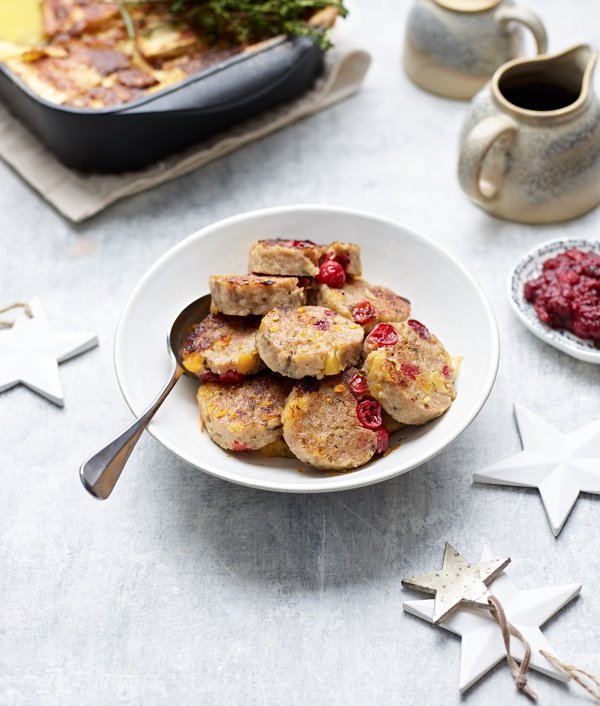
Cranberry, apricot and sage stuffing
INGREDIENTS
100g chopped dried apricots
50g dried cranberries
100g finely diced onion
100g white wine
100g panko bread crumbs
5g chopped sage
250g sausage meat
METHOD
Stuffing can be changed to suit the season, at Christmas time cranberries are perfect but you may like to add chestnuts, and/or mixed spice too. Stuffing can be cooked on its own or can be put into the leg meat and braised in the crown of the turkey.
Method of work
1. Place apricots, cranberries, onions and wine into a pan, bring to a boil and simmer for 2 minutes, then add the bread crumbs into the pan
2. Cling film and leave to cool for 2 to 3 hours
3. Mix all the rest of the ingredients together in a bowl and season with salt and pepper
4. When the apricot mix is cooled add into the bowl with the rest of the ingredients, mix well
5. Place in a loaf tin lined with a grease proof cake liner and make sure it is flat on top, cover with foil and then place into the oven at 100°C and cook for 45 minutes
6. Serve straight away or chill until required
7. If chilling when reheating the stuffing, take out of the tin and slice, then place onto an oiled tray and put in an oven for 8 minutes at 180°C degrees
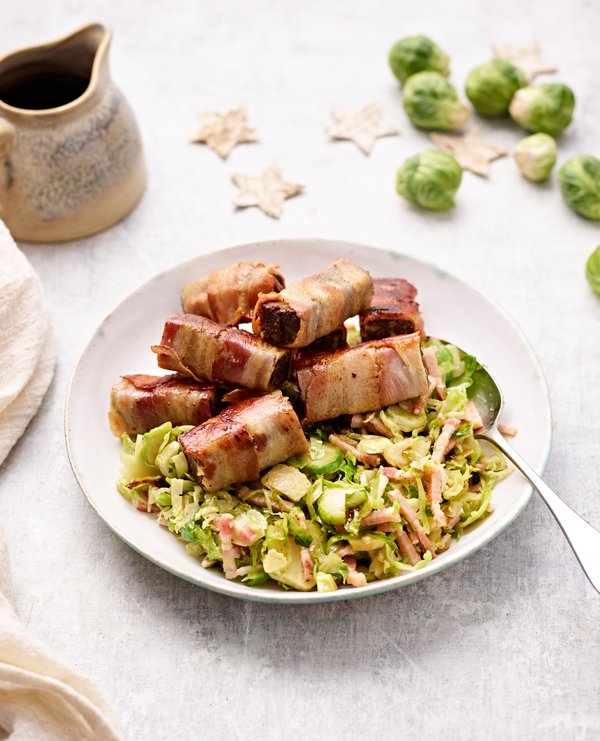
Festive Black pudding in blankets
INGREDIENTS
10g butter
65g diced onion
6g minced garlic
5g salt
4g curry powder
50ml double cream
80g minced pork belly (raw)
40g prunes chopped
75g chopped dried apple
90g dried pigs blood (available from good butchers* or online) soaked in 160ml warm water for 20 minutes
24 slices of smoky streaky bacon
* local to us we get our dried pigs blood from our butcher Vicars Game. If you wanted to give them a call they can organise some for you too – tel: 01635 579662.
METHOD
Method of work:
1. Gently fry the onions and garlic in the butter and salt for 5 minutes until soft but with no colour
2. Add the curry powder and cook out for 2-3 minutes
3. Then add the cream and cook on a low heat until reduced by half
4. Add this to the pork mince, prunes and apples in a suitable bowl allowing you to mix it all together
5. Now add the soaked pig’s blood into the same bowl so all the mix is combined, mix with a spoon to help you
6. Place in a lined loaf tin either with cling film or a grease proof liner and make sure you push down the mix so is flat on top
7. Place in an oven at 130°C for 40 minutes. To check it is cooked, like a cake place a knife in the middle and if it comes out clean it is ready, take out and chill
8. When it has chilled cut into small rectangles and wrap in thin slices of smoky bacon
9. To cook place on an oiled dish or tray and place in an oven at 180°C for 10 minutes
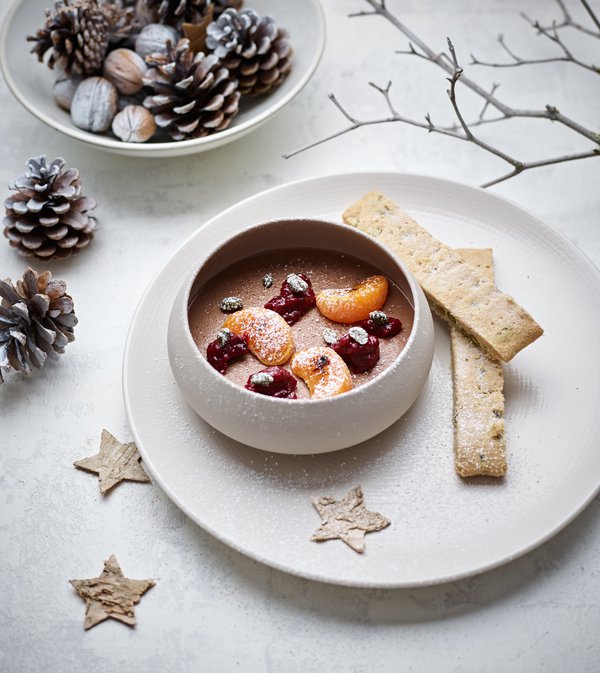
Chocolate posset, cranberry compote and pistachio shortbread
INGREDIENTS
Ingredients for the cranberry compote:
100g cranberries
80ml red wine
40g sugar
Zest and juice of one orange
1 cinnamon stick
1 star anise
.
Ingredients for the posset:
250ml milk
250ml double cream
100ml egg yolk
50ml sugar
1 orange juice and ½ zest
30g dried cranberries
15ml white wine vinegar
240g dark chocolate – 50% to 60%
.
Ingredients for the shortbread:
135g flour
15g rice flour
100g butter
55g sugar
75g chopped pistachios
Cinnamon sugar to dust (50g sugar and 5g ground cinnamon)
METHOD
Chocolate posset, cranberry compote and pistachio shortbread
Serves 4
Chocolate posset:
Posset is amazingly simple to make, the resulting silky texture is almost magical. At Christmas a cranberry compote is the perfect accompaniment.
Cranberry compote – method of work
1. Place all ingredients into a pan and bring to the boil
2. Turn down and simmer for 30 minutes or until all is soft and becomes a sticky consistency looking like jam
Chocolate posset – method of work
1. Scald the milk and cream just bringing it to just under boiling
2. Whisk the yolks and the sugar together in a bowl
3. Pour the milk and cream over the egg mix whilst whisking all the time
4. Put back into the pan and add the orange zest and juice with dried cranberries and vinegar
5. Place back on a medium heat not allowing it to boil and you are looking for the mix to coat the back of the spoon without running all off, then add the chocolate and mix well
6. Pour into the preferred dishes and allow to set in the fridge. These can be kept in the fridge for up to 3 days
7. When serving add the cranberry compote on top and around and finish with segments of clementine or orange
Pistachio shortbread:
We like to use rice flour in our shortbread as this gives it a more crumbly texture. Adding pistachios and cinnamon sugar too is our nod to Christmas.
These shortbread will add a crunch your dessert when served alongside the chocolate posset.
Method of work
1. Sieve the flours together into a bowl
2. Mix together the butter and sugar to a smooth paste in another bowl
3. Now crumb the fat mix into the flours and pistachio, bring to a smooth dough working it in quickly
4. Roll out into a rectangle approx. 1cm deep and allow to rest in the fridge
5. After 15 minutes of resting, create small holes with a fork ensuring not to go fully through to the work surface, 50% depth is good. Bake at 140°C until crisp this will take around 40 minutes
6. When you have removed from the oven cut into finger size pieces with a serrated knife whilst hot and then sprinkle with cinnamon sugar and allow to cool.
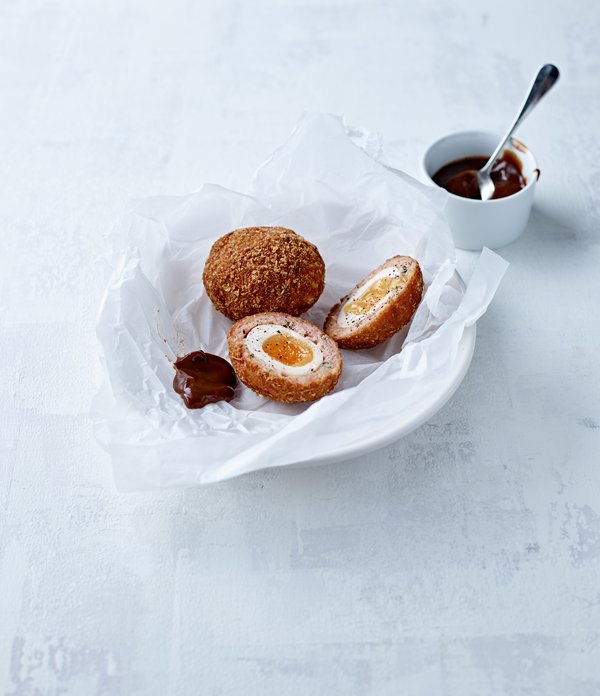
Scotch egg and brown sauce
INGREDIENTS
Ingredients:
5 large eggs
300g good-quality pork sausage
1 tsp black peppercorn
140g cooked ham shredded
25g sage
apple & onion stuffing mix
1 tsp chopped sage
1 tsp chopped thyme
1 tsp chopped parsley
100g plain flour seasoned plus extra for dusting
100g dried breadcrumb (preferablyPaxo)
sunflower oil for frying
METHOD
1. Bring a pan of salted water to a rapid boil, then lower 4 of the eggs into thepan and simmer for 7 mins 30 secs exactly. Scoop out and place in a bowl oficed water, cracking the shells a little (this makes them easier to peel later).Leave them to cool completely, then peel and set aside. Can be boiled the daybefore.
2. Put the sausage meat, pepper, ham, stuffing and herbs in a small bowl, mixto combine, then divide into 4 equal balls. Squash one of the balls between apiece of cling film until it’s as flat as possible
3. One at a time, lightly flour each cooked egg, then use the cling film to helproll the sausagemeat around the egg to completely encase. Repeat with theremaining sausageballs and eggs.
4. Beat the remaining egg and put on a plate. Put the flour and breadcrumbs on 2 separate plates. Roll the encased eggs in the flour, then the beaten egg andfinally the breadcrumbs. Can be prepared up to a day in advance.
5. To cook the eggs, heat 5cm of the oil in a wide saucepan or wok until itreaches 160°C on a cooking thermometer or until a few breadcrumbs turngolden after 10 secs in the oil. Depending on the size of your pan, lower asmany eggs as you can into the oil and cook for 8-10 mins until golden andcrispy6. Drain on kitchen paper, leave to cool a little, then serve cut into half.

